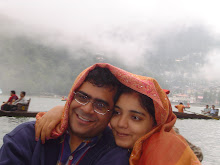
The world has been alight with news of the coordinated attacks against targets in Mumbai for the last two days. What has happened is despicable, and for many of us, inexplicable. This reflection in an online cricket magazine sums up what a lot of us with ties to Mumbai and India are going through:
I have watched a city of a million dreams held hostage by 20 or so men who have purged from their souls every trace of humanity - let's not confer on them the dignity of a religion - and I have felt the blood drain out of me.
I have felt a sense of paralysis and rage. My family and I are safe at home, none of my friends were in the hotels or at the other attack sites; but I am numb, not with fear or personal loss, but something far deeper: a sense of overpowering bleakness.
And of course it's not just Indians who feel this sense; we all share in the outrage and shock simply by virtue of being human.
Certainly these are terrible attacks that must be condemned and the perpetrators - including whoever financed this operation - must be brought to justice.
And a lot of us are also struggling with the question of "why?"
While it's difficult to think about at the moment, we should not be afraid to wrestle with this question, and the answers are not straightforward. One answer is that the so-called war on terror has increased the incidents of violence against civilians in the world and introduced a kind of double standard where "their" lives are not as important as "our lives". The three thousand killed in the World Trade center were the victims of terrorism, but the three thousand killed in the U.S. bombing of Afghanistan immediately thereafter were "collateral damage" in the "war on terror".
As Deepak Chopra says so eloquently in this clip, this kind of attitude leads moderates on all sides to become extremists.
52 years ago, two of the greatest thinkers the world has ever known, Albert Einstein and Bertrand Russell put this question to all of us:
Here, then, is the problem which we present to you, stark and dreadful and inescapable: Shall we put an end to the human race; or shall mankind renounce war?
So far we have been on course for the first option, the annihilation of us all. Let's hope for all our sakes we can learn the lessons that they sought to teach us and get rid of war once and for all.
If successful, we will come a lot closer to ending the insanity like that going on in Mumbai right now.

No comments:
Post a Comment